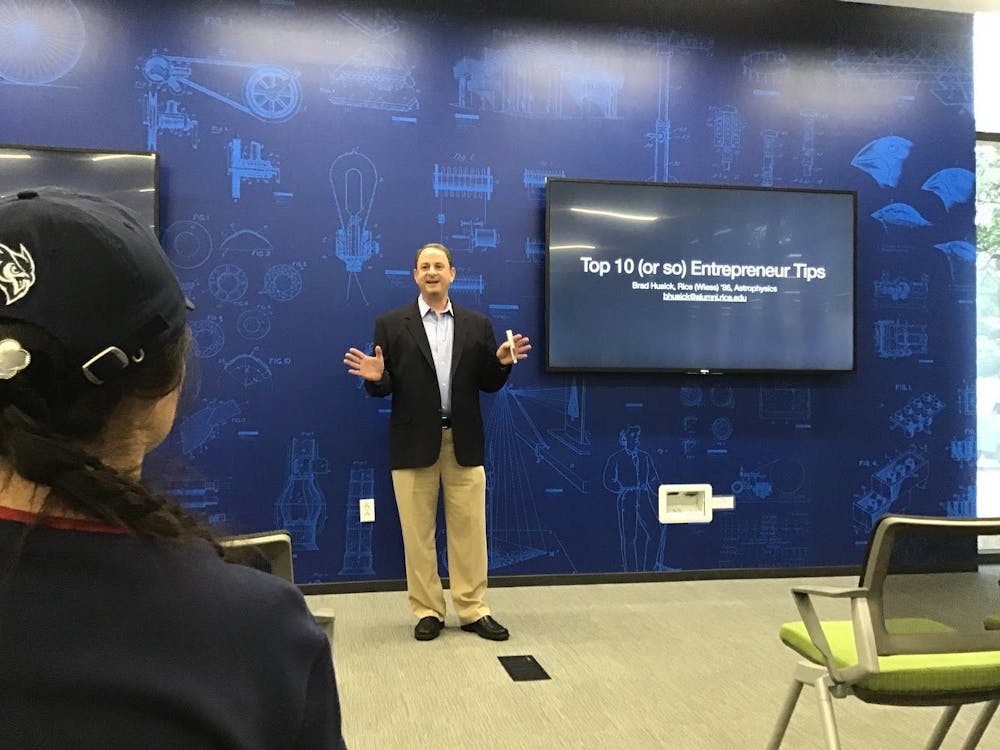Brad Husick, founder of NetGravity, presents tips for entrepreneurial success

Addressing an audience of 70 Rice students and alumni, entrepreneur Brad Husick shared his top 10 tips entrepreneurs use to succeed at the Liu Idea Lab for Innovation & Entrepreneurship this Monday.
Jamie Jones, executive director of LILIE, introduced Husick (Wiess College ‘86), who graduated with a bachelor’s degree in astrophysics.
According to Jones, Husick co-founded NetGravity, an advertising technology platform that was sold for $530 million to a company later acquired by Google, and has also built a stock photography company that was later sold to Getty Images.
“Brad is the perfect example of how you apply the entrepreneurial mindset that you learn through classes that you take with LILIE with a deeply technical degree, like his astrophysics degree,” Jones said. “He decided to ... go into the entrepreneurial side of his career, and I think that’s really meaningful. And I hope that it’s something that we can help train students to do.”
Solve real problems, don’t just have cool ideas.
Husick said that the aspiring entrepreneur should jumpstart their business ambitions with the following words: “The problem in the world today is...”
According to Husick, when he co-founded NetGravity in 1995 — a time he recalls as wholly lacking in advertisement infrastructure — Yahoo was the only company that ran ad banners.
In a meeting with Yahoo’s former CEO Jerry Yang, Husick said he learned how these ad banners were constructed. An intern would manually encode the advertisements in the web programming language HTML, and each week, they were refreshed onto the Yahoo page.
“We said, ‘Okay, we’re software people, we think we can do better.’ So, we went off and we prototyped an ad management system that would schedule ads, replace them on a page, track how many clicks are happening,” Husick said. “We took the prototype back and we showed it to Yahoo, and they said ‘Okay, how do we buy this?’”
Take (calculated) risks, learn from failure.
Husick recalled co-founding a company in the early 2000s called Webaroo, which – much like a kangaroo hoists around a pouch – can hold an offline snapshot of the internet in 40 gigabytes.
Shortly after Webaroo was launched, however, Husick said that his newfound company was displaced by the advent of 4G wireless connectivity.
“The jump from 3G to 4G was going to require something like a $9 trillion investment on the part of the wireless companies,” Husick said. “And we made a bet that it was going to take them longer than they thought it was going to take. They invested $9 trillion, and they built 4G. So now we've got 4G everywhere ... There’s no more need for Webaroo. And yet we invested all this time.”
After this initial failure, one of the co-founders decided to repurpose Webaroo into a text-message-based networking platform called Webaroo SMS Gupshup — “gossip” in Hindi — which, Husick said, has ballooned into a platform serving 100 million users a month.
“Be willing to say, ‘Hey it’s maybe not the right time,’” Husick said. “But if you’ve got a strong connection with your co-founders and people that you work with, and they believe you can pivot to new ideas, maybe [you can] take advantage of new opportunities in the market.”
Work on things you love.
Husick recounts stumbling upon the TED Talk of then-17-year-old Boyan Slat, who founded Ocean Cleanup, a nonprofit technology company with the goal of ridding the ocean of floating trash, after scuba diving in the Mediterranean and encountering more plastic than fish.
Last year, Husick was invited to join the Ocean Cleanup team as a marketing advisor, a role he describes as a phenomenal experience.
“I wrote him a letter, two years ago, and said, ‘Here’s my background: I’m not an oceanographer ... I know how to run organizations,’” Husick said. “My kids were really proud of me too [and told me], ‘Dad you’re working on something that really matters.’ Work on things you love, even when it’s not obvious that it’s going to make you money.”
Christina Greenwood, a graduate student in piano performance who attended the talk, said she appreciated the broad-based appeal of the event, sharing her takeaways and voicing her appreciation for the wide-ranged benefits of the Lilie Lab.
“I think [it’s] really good even for people who are looking into ideas outside of Lilie,” Greenwood said. “Because I know for me, I’m looking into ideas of being able to be innovative with music to be able to relate with new audiences.”
More from The Rice Thresher
Rice lands high on Niche, Forbes college ranking lists
Rice recently ranked No. 10 on Niche’s Best Colleges in America list and No. 12 on Forbes’ annual America’s Top Colleges list in 2026. It was also recognized in several categories by the Princeton Review, placing in the top 10 in four categories.
From post-human novels to augmented reality, Rice hires new faculty
Rice welcomed 97 new professors this fall across disciplines, including a posthumanist Harvard scholar, a husband-wife duo and a computer science professor who graduated from Rice thrice.

Rice’s Martel College Texas Party responds to Dis-O and NOD alcohol issues
After a Dis-O that saw four times as many calls for intoxication-related transports of students to the hospital compared to the prior three years, Cory Voskanian, a Martel College socials head tasked with planning the first public of the year, said that he was feeling the pressure.


Please note All comments are eligible for publication by The Rice Thresher.